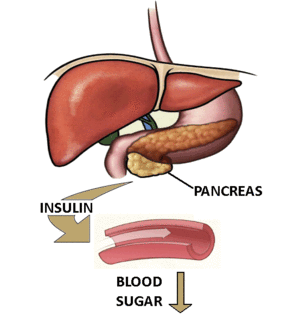 |
| English: Diagram shows insulin release from the Pancreas and how this lowers blood sugar leves. (Photo credit: Wikipedia) |
Last Updated: 2012-12-18 16:00:12 -0400 (Reuters Health)
NEW YORK (Reuters
Health) - One in nine people with diabetes saw their blood sugar levels
dip back to a normal or "pre-diabetes" level after a year on an
intensive diet and exercise program, in a new study.
"Kind of a long-term assumption really is that once you have diabetes there's no turning back on it, and there's no remission or cure," said Edward Gregg, the lead author on the report from the Centers for Disease Control and Prevention.
The research, he told Reuters Health, "is a reminder that adopting a healthy diet, physically-active lifestyle and reducing and maintaining a healthy weight is going to help manage people's diabetes better."
His team's study can't prove the experimental program - which included weekly group and individual counseling for six months, followed by less frequent visits - was directly responsible for blood sugar improvements.
The original goal of the research was to look at whether that intervention lowered participants' risk of heart disease (so far, it hasn't).
But the diabetes improvements are in line with better weight loss and fitness among people in the program versus those in a comparison group who only went to a few annual counseling sessions, Gregg's team reported Tuesday in the Journal of the American Medical Association.
IS IT COST-EFFECTIVE?
About eight percent of people in the United States have diabetes, according to the American Diabetes Association. The new study included 4,503 of them who were also overweight or obese.
People randomly assigned to the intensive program had diet and exercise counseling with a goal of cutting eating and drinking back to 1200 to 1800 calories per day and increasing physical activity to just under three hours per week.
After one year, 11.5 percent of them had at least partial diabetes remission, meaning that without medication their blood sugar levels were no longer above the diabetes threshold. That compared to just two percent of participants in the non-intervention group who saw their diabetes improve significantly.
People who'd had diabetes for fewer years were more likely to have blood sugar improvements, as were those who lost more weight or had stronger fitness gains during the study.
However, less than one-third of people whose diabetes went into remission during the program managed to keep their blood sugar levels down for at least four years, the researchers found.
"Clearly lifestyle intervention is good for people with diabetes," said Dr. John Buse, a diabetes researcher from the University of North Carolina at Chapel Hill School of Medicine.
"The question is how cost-effective is it, what are the long-term consequences (and) how would it really compare with alternative approaches like bariatric surgery and drug therapy?" Buse, who wasn't involved in the new study, told Reuters Health.
Dr. David Arterburn, from Group Health Research Institute in Seattle, said some studies of weight-loss surgery, for instance, have found two-thirds of people who start out with diabetes have complete remission.
Arterburn, who co-wrote an editorial published with the new study, said anyone with diabetes - or at high risk - should consider either lifestyle interventions or surgery, if they're eligible, to reduce future health risks.
Gregg said his team was working on a cost-analysis of the current program, but that it was fairly "resource-intensive."
"If people have access to the support to make these sorts of changes, they may have the benefits that we've seen here," he said. But, "What we should remember is that more modest changes in lifestyle are also effective."
SOURCE: http://bit.ly/JjFzqx Journal of the American Medical Association, online December 18, 2012.
Copyright © 2012 Reuters Limited. All rights reserved.
Republication or redistribution of Reuters content, including by framing or
similar means, is expressly prohibited without the prior written consent of
Reuters.









No comments:
Post a Comment